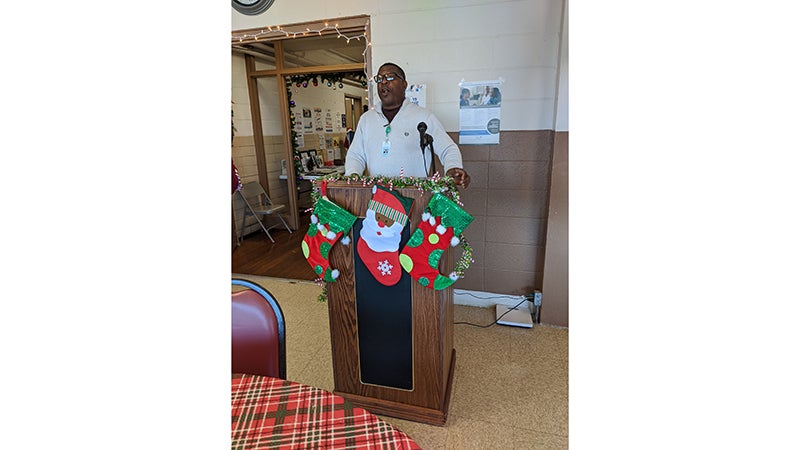Chattahoochee Hospice hosts Grief and Coping with Holidays session
Published 9:00 am Saturday, December 7, 2024

- Talking grief: Chattahoochee Hospice chaplain Michael Stiggers talks to seniors at the Lanett Senior Center about grief at an event in 2021. File photo by Cole Trahan.
|
Getting your Trinity Audio player ready...
|
The holidays can be a rough time of year for many especially older folks in the community who are isolated or experiencing a recent loss. The National Alliance on Mental Illness reported on a 2021 survey by Sesame Care showed that 3 in 5 Americans feel their mental health is negatively impacted by the holidays.
Since the isolation brought on by the COVID-19 pandemic, the holidays can be an especially hard time for seniors and housebound residents. That’s why Reverend Michael Stiggers, chaplain at Chattahoochee Hospice, is holding Grief and Coping with the Holidays session on December 11.
“Closure is a myth,” Stiggers said.
He explained, “People tend to believe that grief gets better over time. ‘Oh, you’ll be back to yourself in a year,’ and it’s simply not true. The truth is we learn how to live with our grief. And who wants to forget about a mother or dad or husband or wife?”
Starting at 1:30 p.m. ET, the chaplain will be offering grief counseling to residents interested for free at the West Point Depot. Though it is open to all, many senior citizens are isolated and lonely in their homes.
It’s something Stiggers has done in the past in Opelika and with local senior centers and has had positive results. Stiggers said he will give participants tips and do’s and don’ts on how to deal with grief.
For one thing, it’s important to hold space for yourself to participate or not participate in activities and not to judge yourself too harshly either way.
“Remember the rule of 60 percent,” Stiggers said. “When you have had 60 percent of what you can handle at a social event, wrap it up. You don’t have to wait till you’re 100 percent ready to go.”
“Grieving takes energy and grieving during the holidays demands a lot of energy,” Stiggers added. “So being with people, even those who you love, requires that energy, and your energy is already in short supply.”
Stiggers encouraged those grieving during the holidays not to feel guilty for prioritizing when it comes to social outings, decorating or other activities that may add strain to them. He added that though everyone grieves, we all grieve differently.
Still, it’s important to remember not to neglect self-care, even if that just means eating healthy, getting enough rest and maintaining an exercise routine. Even though it may not take the pain away, it will help.
As for friends and family of someone dealing with grief, it’s time to change our language around grief. Sometimes in an effort to comfort, we can actually end up saying something that is not helpful.
For example, we shouldn’t say, ‘I know how you feel.’ Other times, we might say things like, ‘It will get better.’ Again, that may not be helpful to hear when going through a loss.
Another common phrase, especially in the South, is “It was God’s will, God knows best or God doesn’t make any mistakes.”
Though all are meant well and with the best intentions, many of these sayings can actually have the opposite effect on someone who is in the midst of grieving. Instead, Stiggers explained, we should say, ‘I don’t know how you feel, but I care about you and that you are hurting,’ or ‘It must be difficult for you right now. I think about you, I care for you, I love you.’
“Grieving is counter intuitive,” Stiggers said. He explained that “It’s just like when you’re tired, so you don’t want to exercise, but if you exercise, it gives you energy, and you won’t be tired anymore. That’s the way grieving is.”
Often, we don’t want to talk about our grief or loss, but only by opening up and allowing ourselves to feel the pain can we move through it and process it.




